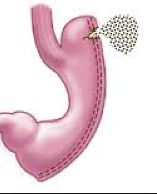Gastric Sleeve Surgery Complication: Leak—Become Knowledgeable About It

One of the newest weight loss surgeries being performed is gastric sleeve surgery. It is performed on people who are obese with a body mass index of 35 or more. When a person has this surgery it involves removing a portion of their stomach and followed by the creation of a thin vertical sleeve of stomach about the size of a banana. The surgeon staples the stomach using a stapling device. This is where the leak complications can happen.
What causes a leak in this area?
There are two main reasons that a leak can occur:
- At the staple line there can be leakages due to intra-abdominal pressure
- Because of a gap or hole that develops somewhere along the staple closure line
Complications from a leak
When a leak happens it can cause a severe infection from the leakage of gastric contents and gastric fluids. This infection can lead to two very serious complications.
- Septic shock—this is when you have low blood pressure with an injury to all of your body’s systems
- Sepsis—this when you have adverse symptoms that involve all of your body systems
Either of these can cause major organ failure, which is when many of your organ systems quit working and in time it can lead to death.
How will you know if you have a leak?
There are many different symptoms that you can have if you have this complication. After having gastric sleeve surgery your surgeon will go over everything with you including any possible complications and the symptoms they would produce. The symptoms for a leak may include:
- Pain in your abdomen that does not better but only gets worse
- You have swelling in your stomach
- Left shoulder or chest pain
- Fever
- Infection
- Dizziness
- Any appearance of being sick
- Rapid heartbeat
- Shortness of breath
You have a leak so how is it fixed?
Fixing this complication of gastric sleeve surgery involves either another surgery or putting in a drainage tube.
- Normally surgery is the first and most common option since it hard to know if it is a leak or stomach bleeding from surgery. The surgeon will reopen the patient, close the hole, and clean up where it was leaking. After surgery you will usually have to spend some time in Intensive Care to make sure that there are no more complications. This second surgery will help to strengthen the staple line of the gastric sleeve.
- Another option of fixing this complication is putting in a drainage tube to drain away the stomach acids. During this time you will be fed either intravenously or using a catheter. This will allow your stomach to heal so the leak will stop and also will help keep the stomach acids from reaching any other organs.
In Conclusion
This is a rare complication and occurs in one out one hundred patients. It can be a life threatening complication if it is not taken care of so bottom line is if something does not feel right, seek immediate medical attention.


